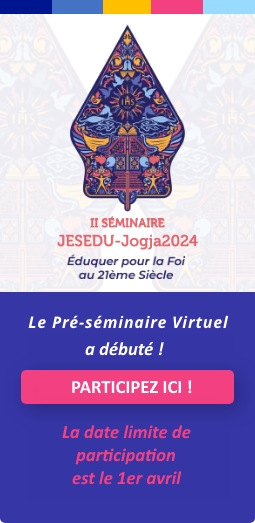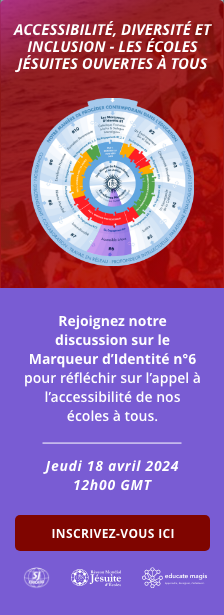The goal of Jesuit education is to empower students to be men and women for others as a response to God’s generosity. A Jesuit education facilitates the growth of conscience, compassion, competence and commitment in the context of academic excellence which lies at the core of Jesuit ethos. It encourages students to reflect on their experiences of life through the lens of Ignatian wisdom in order to help them to be able to identify the signs of God’s presence in a wounded world and how to cooperate with God in reconfiguring the world so that it’s more compassionate and just. These are challenging ideals. But how can we be men and women for others if we do not know who we are? This new book “Pathways to a Decision” by Jim Maher S.J. sets out to answer that question.

Jim Maher S.J. has had more than thirty years teaching in a secondary school and leading retreats and social outreach programmes. Developing the “Principle and Foundation” at the beginning of Ignatius’s “Spiritual Exercises”, the author highlights that each person has to “selve”. This idea is taken from the Jesuit poet, Gerard Manley Hopkins, who challenges each individual to identify and own their true “self”, as a generous response to God’s goodness. We need to know who we are in order to be for others.
In the chapter on the “Principle and Foundation” there is enough material for a short retreat. We are strongly encouraged to challenge the unexamined conventional wisdom that gets in the way of becoming who we are. It’s difficult for Jesuit students and staff to be who they’re meant to be if the consumer culture, the fashion industry and a multitude of unexamined assumptions are calling the shots. The cacophony of voices competing for the loyalty of our staff and students needs to be highlighted as it makes it difficult for young men and women to own who they are if they don’t feel they have conformed to the cultural stereotypes.
Jesuit schools are meant to be prophetic. This book is a challenge to reclaim our identity. There is an account of how to interpret our fluctuating moods following Ignatius’s guidelines on discernment so that we are more faithful to our “self” and at peace. Generous people can be drawn to overstretch themselves because the bad spirit can appear as a wolf in sheep’s clothing. The idea of “magis” can generate a sense of failure and frustration because we may feel we’re lagging behind. Working in schools is a challenging occupation especially when students appear to be indifferent to our best efforts. This book helps to maintain perspective and to remain in good space drawing from Ignatius’s experience, by encouraging us to assess our motivation using Ignatius’s guidelines to make prudent and intelligent decisions on how to harness our energies. “Good enough” can often be more than adequate. Sometimes we may impose unrealistic expectations on ourselves leading to chronic stress, burnout and depression.
The “Examen of Consciousness” is described and there is an account of strategies for personal growth coming out of our prayerful reflection during our Examen. Two chapters deal with decision-making the first of which addresses the personal dispositions needed to make a good decision. For Ignatius, it is essential to be in good space and free from blind spots, and any feelings, good or bad, attitudes or prejudices that could prevent us from making good decisions. For those making serious decisions, they would do well to consider the content of this chapter to help them on their way. Too many decisions are made in bad space and a lack of awareness of what’s driving the decisions. The author then deals with the Ignatian methods of making a decision which involve the use of reason, feelings and imagination. This book is not an academic tome. Its style is accessible and down-to-earth. Poetry, anecdotes, and imagery help to make concrete what is abstract. Those who’ve read it suggest reading it with a pen to either annotate the text itself or to journal. It’s the kind of book, once read, can be returned to time and time again to personally reinforce the Ignatian guidelines. Reading this book will help the reader to get in touch with their true self so that they can be men and women for others in response to God’s loving embrace. To facilitate this the final chapter suggests that for busy people such as students and school staff, oasis moments are essential. There are some suggestions to on how to do that.
When we have found our own distinctive voice with its own unique timbre, then we can be men and women for others because we know how we can share our own particular “self” with others. As educators already know, what students often remember in later years is what they learned from “reading” the teacher whose “self” was the most important teaching tool and whose life-style was the catalyst for becoming a man or woman for others. This book will enrich students and educators.
My true self is expressed through those experiences that facilitate my friendship with God, my relationship with myself, others and all created reality. My true self is my spiritual centre where I am who I am meant to be. This is summed up in St Catherine of Siena’s words when she writes: ‘Be who God meant you to be, and you will set the world on fire!’ This reference to Catherine was in the opening sentence of the Bishop of London’s sermon at the wedding of Prince William and Kate Middleton. He developed this idea by saying that: ‘God meant each one to be, their deepest and truest selves.’ Canadian poet Oriah Mountain Dreamer, in her poem ‘The Invitation’, captures the essence of this challenge when she says: ‘It doesn’t interest me / what you do for a living. / I want to know / what you ache for / and if you dare to dream / of meeting your heart’s longing.’ If my life is a matter of following the leader and trying to be like everybody else, I won’t have lived. Who I am is not determined by others, by the celebrity or consumer culture. I am not what I have. I am not what I own. I am richer than that. But my false self would have me believe that unless I conform to the unquestioned cultural notions of success, I am a nobody. How sad is that mistaken idea!” Pathways to a Decision With Ignatius of Loyola, Jim Maher S.J., Messenger Publications, pbk, 102 pages,2020.
« Pathways to a Decision » is currently available through Messenger Publications, Amazon UK, kindle and paperback, and many other sites and should be in bookshops shortly.

Se connecter ou Adhérer
pour créer et afficher des commentaires

